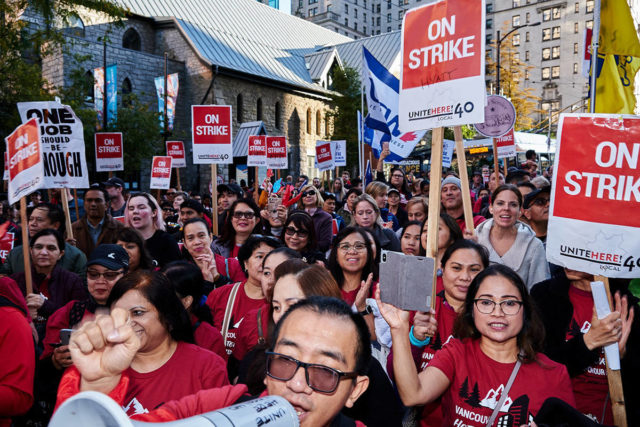
Labor Day 2021: With More Than 11 Million U.S. Employees, Private Equity Must Take Responsibility for Its Workforce
September 1, 2021
Private equity firms have often taken a low road approach and sought to reduce wages, benefits, and staffing at firms they acquire – with devastating consequences to thousands of workers, their families and their entire communities. The private equity industry manages nearly $7.4 trillion in assets[1] and owns companies that employ more than 11.7 million American workers, plus millions more around the world.[2] The industry can afford to be responsible employers that provide safe and fair workplaces.
- Paying a sustainable wage of at least $15 an hour
- Providing paid sick leave and affordable healthcare
- Committing to end occupational segregation
- Providing safe working conditions
- Paying severance during layoffs
- Protecting workers’ rights to organize
PESP Executive Director Jim Baker explained, “Private equity-owned companies employ millions of workers in the United States, and the number continues to grow as private equity firms are acquiring additional companies at a record pace.”
“This Labor Day, we are calling on the private equity industry to correct its course on how it treats American workers. At the expense of American families and communities, private equity firms have been focused on growing cash flow. We are calling on private equity firms to institute a set of standards to improve working conditions at the portfolio companies that they own.”
“Too often, a private equity takeover comes with outsize returns for its executives and layoffs or pay cuts for workers,” said Anastasia Christman, Worker Power Program Director at the National Employment Law Project, adding that “despite claims of managerial expertise, private equity-owned retail companies have laid off hundreds of thousands of workers due to store closures and bankruptcies. Private equity controls ever-larger proportions of our economy; it’s time for the private equity industry to take responsibility and create equitable workplaces for the more than 11 million workers its companies employ.”
The largest number of workers employed by private equity-owned companies are in industries with large numbers of low-wage workers – at least 1.5 million workers in Food Service, 1.1 million workers in Retail, and almost 1 million in both Security and Health Care.
- In December 2020, Roark Capital acquired Dunkin’ Donuts, bringing the total number of workers at its companies or franchisees to almost 1 million.
- Earlier this year, the Warburg Pincus-owned Allied Universal Security acquired G4S and now has over 800,000 workers globally.
- In the last year and a half, Apollo Global Management has more than doubled the number of employees at its companies through acquisitions such as its buyout of Alorica, a call center operator with 100,000 workers, and Michael’s craft stores with 45,000 workers.
- A Sustainable MinimumWage – Increasingly large employers are committing to pay all workers, including tipped workers, at least $15/hour.[3] The private equity industry directly employs more than 11.7 million workers,[4]and is large enough to dominate wage markets. As such, PE firms should commit to pay the equivalent of US prevailing wages (as set by the SCA or the DBA) with a $15 floor, plus the accompanying fringe benefit rate. Studies have shown that prevailing wages help close racial wealth gaps, lift families out of poverty, and increase productivity while reducing injury rates.[5]
- Paid Sick Leave and Affordable Health Care – The majority of food service and retail workers in the United States lack paid sick leave, which is especially disturbing considering that these are also frontline workers who have worked through the pandemic. Private equity firms should ensure that the companies they own protect American workers and the public’s health by providing paid sick leave and health care coverage for their employees.
- A Commitment to End Occupational Segregation – More than half of Fortune 500 companies now disclose data on the racial and ethnic composition of their workforces, recognizing this is a critical step to ending systemic bias in US employment.[6]Given the size and diversity of the private equity economic footprint, PE firms should develop recruitment and retention plans for their portfolio companies that lay out concrete goals for hiring BIPOC, LGTBQ+, women, and workers with disabilities, and in the interest of transparency and accountability they should make those plans publicly available.[7]
- Safe Working Conditions – Private equity firms should ensure that all direct and contracted employees of their portfolio companies have safe working conditions and the training and protective equipment they need to do their jobs safely.
- Protections in the Event of Layoffs – Since private equity-owned companies are prone to bankruptcies and layoffs, private equity firms should commit to provide severance of at least one week’s pay per year of employment to laid-off workers.
- A Voice at Work – Workers at private equity-owned companies deserve a voice on the job and the ability to organize free from intimidation and harassment. Nonunion workers make only 84 percent of earnings compared to union members ($958 per week versus $1,144)[8]. Unionized workforces help level the playing field, particularly for workers of color[9]and during times of unexpected crisis such as during the pandemic.
[1] https://www.pionline.com/alternatives/assets-alternative-investments-set-record-2020
[2]https://www.investmentcouncil.org/wp-content/uploads/ey-aic-pe-economic-contribution-report-final-05-13-2021.pdf
[3] “Why the US needs a $15 minimum wage,” Economic Policy Institute Fact Sheet, January 26, 2021. https://www.epi.org/publication/why-america-needs-a-15-minimum-wage/
[4]https://www.investmentcouncil.org/wp-content/uploads/ey-aic-pe-economic-contribution-report-final-05-13-2021.pdf
[5] Malike Wall, David Madland, and Karla Walter, “Prevailing Wages: Frequently Asked Questions,” Center for American Progress, December 22, 2020. https://www.americanprogress.org/issues/economy/reports/2020/12/22/494144/prevailing-wages-frequently-asked-questions/
[6] Results of a Fortune Magazine and Refinitiv study, reported in David Craig, “Companies will need courage to keep their promises on race,” Fortune Magazine, June 2, 2021. https://fortune.com/2021/06/02/racial-equity-diversity-inclusion-data-fortune-500-measure-up/
[7] McKinsey & Company, “Diversity Wins: How Inclusion Matters,” May 19, 2020. https://www.mckinsey.com/featured-insights/diversity-and-inclusion/diversity-wins-how-inclusion-matters
[8]https://www.bls.gov/news.release/union2.nr0.htm
[9]https://www.epi.org/press/union-workers-are-paid-11-2-more-and-have-greater-access-to-health-insurance-and-paid-sick-days-than-their-nonunion-counterparts-policymakers-must-strengthen-workers-ability-to-form-unions/
Photo: UniteHere Local 40
